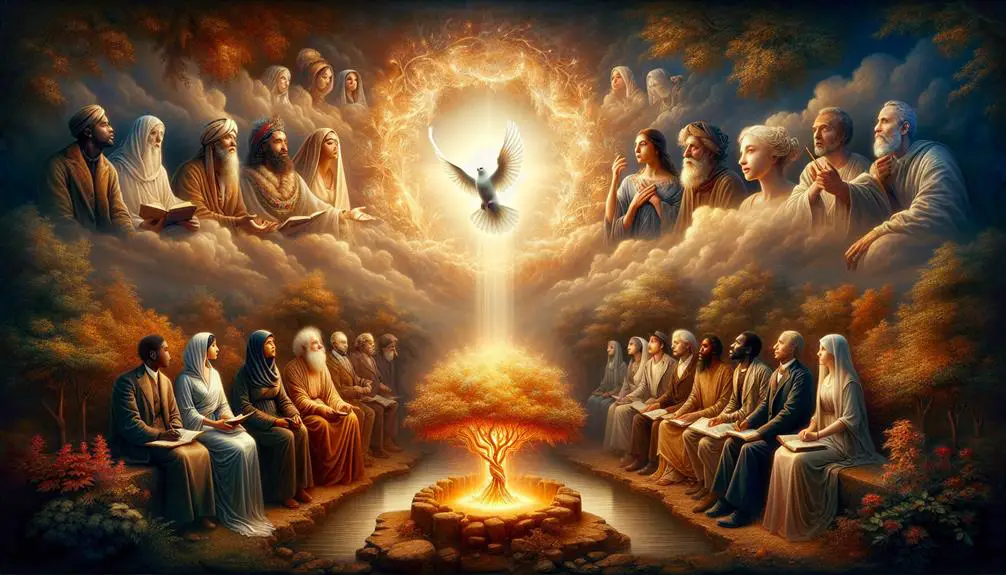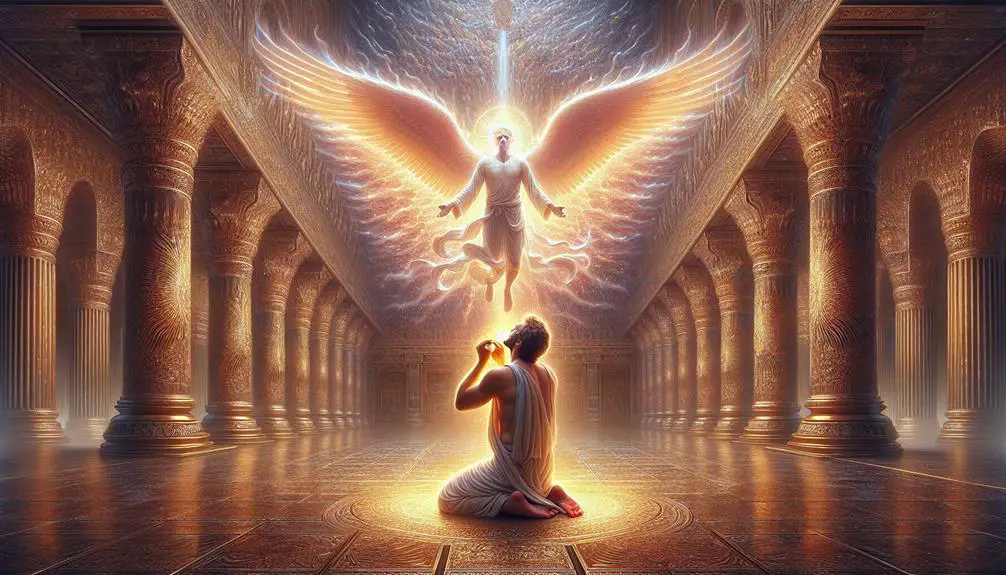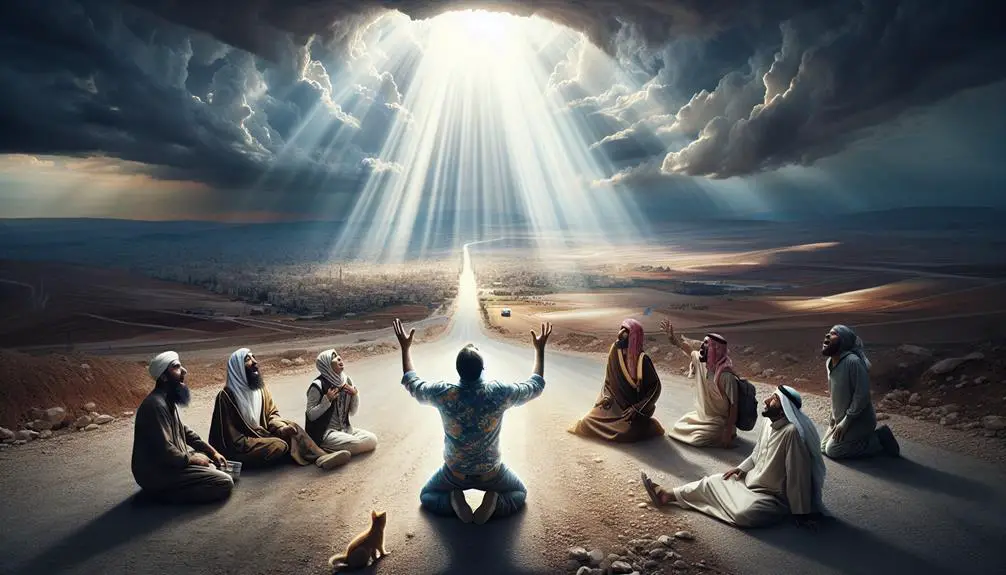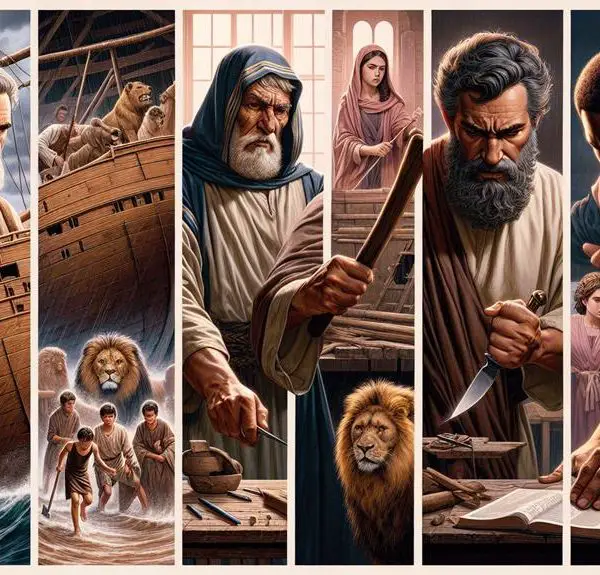Peek into the profound encounters with God in the Bible, unveiling timeless lessons on faith, obedience, and transformation awaiting discovery.

Encounters With God in the Bible
Most are unaware that each encounter with God in the Bible carries its unique symbolism and lesson, transcending mere historical events. You might find it intriguing how these divine meetings, from Moses's awe-inspiring moment at the burning bush to Paul's life-altering experience on the road to Damascus, encapsulate profound truths about faith, obedience, and transformation.
As you explore these narratives, consider what they reveal about the nature of divine-human interaction and its implications for understanding one's own spiritual journey. This conversation opens a pathway to rediscovering timeless wisdom embedded within ancient texts, inviting you to uncover layers of meaning that might have previously eluded you.
Key Takeaways
- Divine encounters often lead to significant personal transformation and spiritual awakening.
- Symbols like the burning bush and blindness represent God's presence and transformative power.
- Divine interventions serve as pivotal moments for redemption and realizing one's divine purpose.
- Encounters with the divine underscore the universal reign of God and the transformative power of divine grace.
Moses and the Burning Bush

In examining the encounter between Moses and the burning bush, one observes a pivotal moment where divine communication challenges and transforms human understanding. This narrative isn't merely a tale of an ancient miracle; it's a profound exploration of divine revelation and the sanctification of space, turning ordinary ground into sacred ground. You're invited to delve into the layers of meaning behind Moses' experience, recognizing its significance in the broader context of divine-human interaction.
Divine revelation, in this context, transcends the mere imparting of information. It's an invitation into a relationship, a call to step beyond the known into a realm led by the divine. The burning bush, which burns without being consumed, serves as a potent symbol of God's enduring presence, illuminating yet not overwhelming. This imagery challenges you to rethink your understanding of the divine, presenting a God who's both immanent and transcendent, intimately involved yet wholly other.
The declaration of the ground around the bush as sacred ground marks a transformation not just of the physical space, but of Moses himself. It underscores the idea that divine encounters redefine boundaries, turning the mundane into the miraculous. You're encouraged to reflect on the notion that sacredness isn't inherent to a place but is conferred upon it through divine presence and human recognition.
This narrative invites you to contemplate your own moments of revelation, however subtle they may be. It suggests that sacred ground can emerge anywhere, provided one is open to the possibility. In Moses' story, you find a template for understanding how divine revelation can challenge and expand human understanding, transforming the ordinary into the extraordinary.
Jacob Wrestles at Peniel

Jacob's wrestling at Peniel stands as a seminal event, marking a profound transformation in his personal identity and his relationship with the divine. This encounter, often referred to as divine wrestling, is not just a physical struggle but a metaphorical journey towards self-discovery and spiritual awakening. It's here you see Jacob emerge not just victorious but transformed, bearing a new name and a new purpose.
The narrative of Jacob's night-long struggle with a mysterious figure—interpreted by many as God or an angel—highlights the intense, personal encounters individuals can have with the divine. This wrestling match, laden with symbolic meaning, serves as a pivotal moment of identity transformation for Jacob. It's a testament to the power of perseverance, the value of confronting one's fears, and the profound impact of divine encounters on human identity.
Aspect |
Before Peniel |
After Peniel |
|---|---|---|
Identity |
Jacob, the supplanter |
Israel, one who struggles with God |
Character |
Deceptive, cunning |
Honest, blessed |
Relationship with the Divine |
Transactional, distant |
Personal, direct |
This table succinctly encapsulates the transformation Jacob undergoes. Before Peniel, Jacob is known as the supplanter, a man who deceives. After this divine wrestling, he earns the name Israel, symbolizing his struggle and intimate encounter with God. His character evolves from being deceptive to embodying honesty and receiving blessings. Similarly, his relationship with the divine shifts from a somewhat transactional nature, where blessings and birthrights are cunningly obtained, to a direct, personal engagement, marking a significant shift in his spiritual journey.
Isaiah's Vision in the Temple

Just as Jacob's encounter at Peniel reveals the transformative power of divine wrestling, Isaiah's vision in the Temple offers profound insights into the nature of prophetic calling and divine majesty. You'll find that the Temple's significance isn't just in its being a physical space for worship, but also as a symbolic gateway to divine revelation. Isaiah's experience within its walls isn't merely an account of prophetic initiation but a narrative rich in vision symbolism that speaks volumes about the relationship between the divine and the human realms.
In this vision, Isaiah sees the Lord seated on a throne, high and exalted, with the train of his robe filling the temple. This imagery isn't just about grandeur. It symbolizes God's sovereignty and the overwhelming nature of His presence, which transcends the confines of space and human understanding. The seraphim's cry of 'Holy, holy, holy is the Lord Almighty; the whole earth is full of his glory,' underscores the universal reign of God, reminding you that divine majesty isn't confined to the Temple but envelops the entire creation.
Moreover, the act of a seraphim touching Isaiah's lips with a coal from the altar signifies purification, a necessary preparation for Isaiah's prophetic mission. This element of the vision emphasizes the necessity of being cleansed or made holy before one can stand in the presence of the divine or partake in divine assignments.
Isaiah's vision in the Temple, therefore, isn't just a personal encounter with the divine. It's a profound exposition on the nature of God's holiness, the significance of the Temple as a place of encounter, and the transformative journey of a prophet called to serve amidst the complexities of human existence.
Elijah on Mount Horeb

Elijah's retreat to Mount Horeb represents a pivotal moment of introspection and divine encounter, revealing the nuanced dynamics of faith under trial. In your journey through the biblical narrative, you'll find that Elijah's experience in cave solitude isn't just an escape but a profound engagement with the divine. Unlike the grandiose manifestations God had previously shown, it's in the divine whisper that Elijah finds clarity and purpose.
This encounter illuminates the essence of personal faith journeys, where grand revelations may give way to subtler, yet profoundly moving experiences of the divine. The still, small voice that Elijah hears isn't just a literal whisper but a metaphor for the quiet yet powerful ways in which faith manifests in times of doubt and fear.
Aspect |
Significance |
|---|---|
Cave Solitude |
Symbolizes a retreat into the self for reflection and clarity. |
Divine Whisper |
Represents the subtle, intimate ways God communicates, contrasting with grandiose displays of power. |
Elijah's Reaction |
Reflects human vulnerability and the need for divine reassurance. |
God's Presence |
Indicates that divine encounters can occur in moments of quietude and introspection, not just in dramatic events. |
Renewed Mission |
Suggests that true understanding and direction often follow periods of doubt and solitude. |
Elijah's narrative teaches you that divine encounters often come in unexpected forms. It challenges you to listen for the divine whisper in your life, recognizing that God's guidance often emerges not amidst noise and chaos, but in silence and solitude.
Paul's Road to Damascus Encounter

Moving from the quiet whisper encountered by Elijah, we now explore Paul's transformative Road to Damascus encounter, where a dramatic revelation reshapes his path and understanding of faith. This pivotal moment in scripture exemplifies divine transformation at its most profound, illustrating how direct encounters with the divine can radically alter one's life trajectory and spiritual comprehension.
Before this encounter, Paul, then known as Saul, is depicted as a fervent persecutor of Christians. His journey to Damascus, initially aimed at hunting down followers of Jesus, takes an unexpected turn when a blinding light from heaven suddenly engulfs him. This moment isn't just theatrics; it's a profound manifestation of divine intervention that stops Paul in his tracks, both literally and metaphorically.
The voice of Jesus questioning Paul's persecution is an invitation to introspection and change. This encounter isn't merely about divine confrontation but also about offering a chance for redemption and transformation. Paul's temporary loss of sight, which occurs immediately after the encounter, symbolizes his spiritual blindness. The subsequent restoration of his sight, facilitated by Ananias in Damascus, isn't just a physical healing but also signifies the opening of Paul's spiritual eyes. He now sees the world and his purpose within it through a new lens, one that's aligned with divine will.
Paul's Road to Damascus experience underscores the theme of divine transformation through direct divine encounter. It highlights the potential for change, even in those seemingly most opposed to it, and illustrates the transformative power of divine grace that leads to sight restoration, both physically and spiritually, paving the way for a new chapter in the spreading of the Christian faith.
Frequently Asked Questions
How Have Interpretations of These Divine Encounters Changed in Modern Theology Compared to Ancient Understandings?
In modern theology, interpretations of divine encounters have evolved significantly. Through historical context and literary analysis, scholars now understand these experiences as complex, multi-layered events.
Unlike ancient views that often took narratives at face value, you're encouraged to consider cultural, historical, and literary nuances. This shift reflects a deeper, more reflective approach to understanding spirituality, encouraging a broader perspective on how divine interactions are comprehended in today's world.
What Are the Psychological Theories Behind Individuals Claiming to Have Experienced Encounters With God, According to Contemporary Psychology?
Imagine feeling a presence so profound, it seems divine.
Contemporary psychology suggests these experiences might've neurological origins.
Researchers delve into hallucination studies, exploring how the brain can conjure such powerful encounters.
They analyze patterns and triggers, reflecting on personal and cultural influences that shape these moments.
This scholarly journey unveils a complex interplay between our psyche and external stimuli, offering a deeper understanding of these profound experiences.
How Do Different Religious Traditions Outside of Christianity and Judaism Interpret Similar Experiences of Divine Encounters?
You'll find that religious traditions beyond Christianity and Judaism offer unique insights into divine encounters. Islamic perspectives often interpret these experiences as profound spiritual insights or messages from Allah, emphasizing the importance of submission to divine will.
Meanwhile, Hindu interpretations may view them as moments of union with the ultimate reality, Brahman, reflecting a diverse range of spiritual paths and practices. Each tradition brings its nuanced understanding to these profound experiences.
What Role Do These Encounters With God Play in the Development of Ethical and Moral Standards Within the Communities That Share These Texts?
In exploring how divine encounters shape ethical evolution, it's clear they're pivotal. They're not just stories; they anchor moral standards, guiding community cohesion.
As you delve into these narratives, you'll see they're foundational in forming collective ethical frameworks. Reflecting on these encounters encourages a shared moral compass, fostering unity.
Essentially, they serve as a moral keystone, binding communities with a common understanding of right and wrong, shaping their ethical landscape.
Are There Any Documented Cases of Similar Divine Encounters in the 21st Century, and How Are They Validated or Scrutinized by Religious Scholars and Scientists?
You might think divine encounters can't happen in our modern era, but they're reported even amid technological influences and cultural skepticism.
In the 21st century, individuals claim to experience the divine, sparking debates among religious scholars and scientists. These claims are scrutinized through both faith-based perspectives and scientific inquiry, reflecting a complex process of validation.
This scrutiny underscores the ongoing relevance of such experiences, challenging our understanding of the divine in contemporary society.
Conclusion
In your journey through biblical narratives, you've traversed mountains and deserts, witnessing the divine intersect with the mortal. These encounters, from Moses' fiery rendezvous to Paul's illuminating revelation, aren't mere tales of old but living testaments to transformative encounters with the Divine.
Like a beacon in the night, they guide us toward understanding our own spiritual quests. They remind us that, in our search for meaning, we, too, may find ourselves standing on holy ground.



Sign up